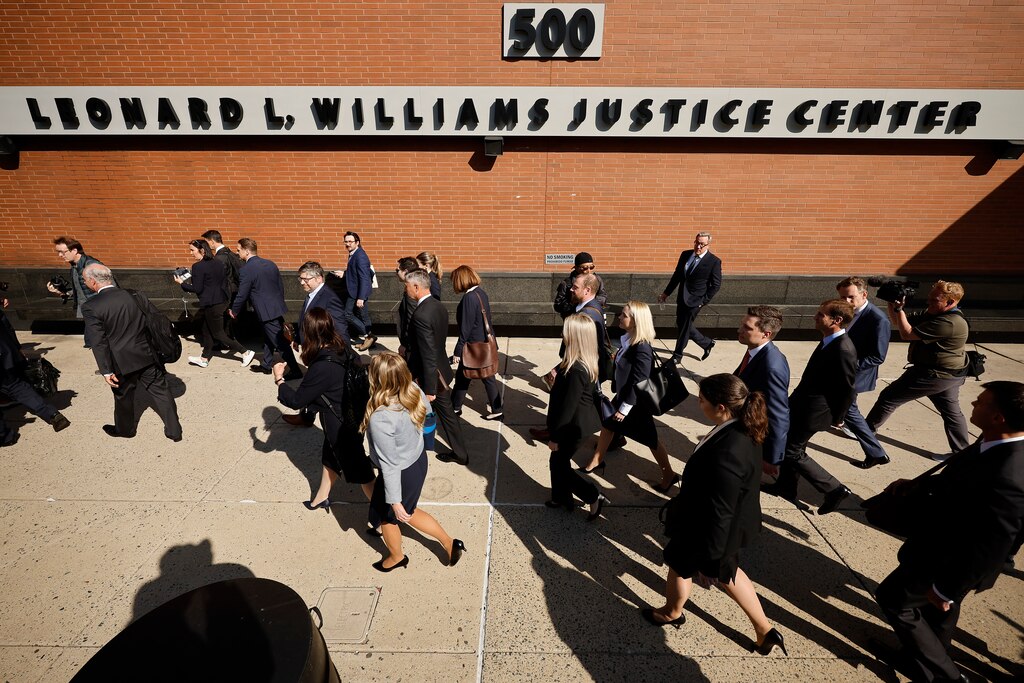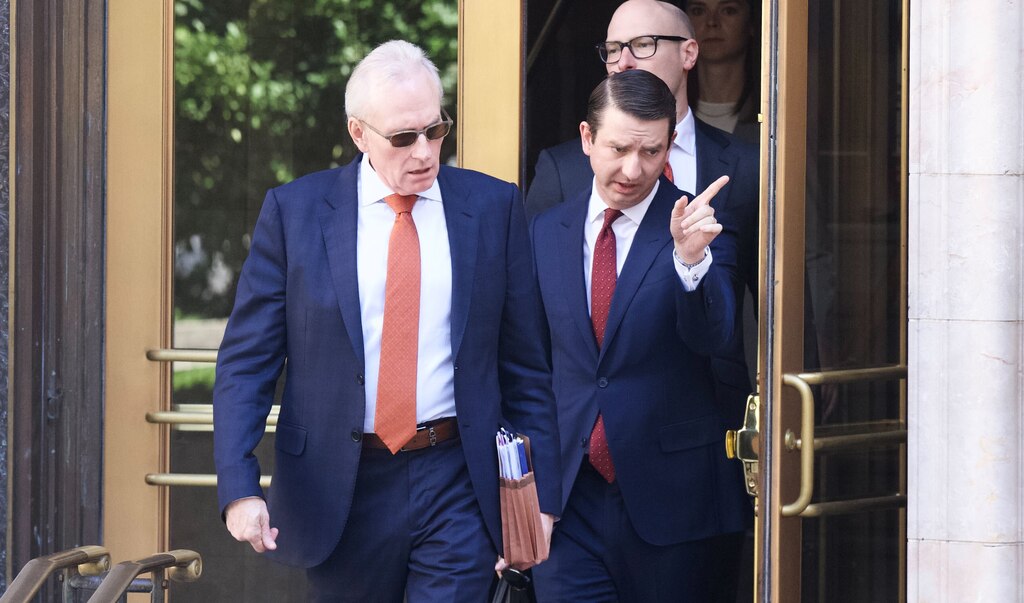In 2017, amid a growing national wave of lawsuits against opioid companies, the city of Baltimore began searching for a law firm to handle its case.
It was already clear Baltimore was suffering a devastating opioid crisis, and the city’s Law Department decided early on that it would make a forceful case against drug companies that shipped millions of painkillers into the region, said Andre Davis, a retired federal judge who was the city’s top lawyer at the time.
“We wanted an aggressive law firm that would not hesitate, on our instruction, to take the case to trial and not just accept the first offer that was made to settle the case, or even the second offer or the third offer,” Davis recalled.
After multiple interviews, the city chose Susman Godfrey, a boutique Houston-based firm that has fought election misinformation in the courtroom and was one of several firms that helped hold Michigan leaders accountable for tainted water and end real estate agent fees and practices likened to a cartel.
Six years into the opioid lawsuit, the firm was little known to most Baltimoreans until recently, when money began flowing in from settlements with pharmaceutical giants and the city’s case went to trial. Baltimore’s decision to reject earlier settlements with opioid companies and hold out for more money has undeniably worked, bringing in more cash for the city than the entire state of Maryland received as part of one group settlement with opioid distributors.
Attorneys familiar with Susman Godfrey said the firm is known for its innovative approach and that adversaries know it isn’t bluffing about taking cases to trial. Baltimore has hired a top-tier firm at no upfront cost and little risk, one expert said.
“The mindset of Susman is that we’re going to be prepared to try the case; we’re going to be aggressive and give the client the best work that we can do,” said Ryan McConnell, a lawyer who practices and teaches law in Houston. “They take every case with a mind that, if it goes to trial, they’re going to be the firm that can try the case.”
Susman Godfrey was behind one of the largest-ever defamation settlements, reached last year between Fox News and the firm’s client, Dominion Voting Systems, over the news network’s promotion of misinformation about the 2020 election.

The firm also helped negotiate a $600 million settlement in a class-action lawsuit over the water crisis in Flint, Michigan; represented home sellers in a massive antitrust lawsuit against the National Association of Realtors; sued Google for allegedly misleading users about data tracking in private browsers; and won a $4.7 billion jury award in a lawsuit over the NFL’s pricing of its Sunday Ticket broadcast package — though that verdict has since been thrown out and is awaiting appeal.
Baltimore had worked with Susman Godfrey before, Davis said. It represented the city in a 2012 class-action lawsuit against big banks accused of participating in an interest-rate-rigging scheme. Susman Godfrey impressed the Law Department with its work on the case, he said.
Founded in 1980, the firm pioneered the idea of taking big, complex commercial cases on contingency, meaning the firm does not get paid unless it wins.
The approach means less risk for Susman Godfrey’s clients because they don’t have to use their resources to pay for legal services up front — they simply give the law firm a chunk of the winnings at the end of the case. It also means Susman Godfrey has an incentive to pick cases it believes can win.
“When you’re billing hourly, you’re selling that [experience] incrementally, so you’re limited based on the number of associates and the time in the day,” McConnell said. “If you get 40% of a case that settles for $100 million or goes to trial … there’s no comparison to hourly work if you’re good at picking those cases and trying those cases.”
The firm’s recent successes allowed it to pay enormous bonuses to associates in 2023, more than triple what other, larger law firms said they would give that year.
Managing partners Vineet Bhatia and Kalpana Srinivasan said at the time that Susman Godfrey was “in a truly extraordinary moment in the 40-plus-year history of the firm, with our highest-ever revenue and a record number of cases tried over the last year and a half,” Reuters reported.

Susman Godfrey’s track record and high profile make it a formidable opponent, lawyers said, providing leverage in settlement negotiations.
“There’s a definite advantage when the other side knows your team is willing to go to trial and has been successful at trial,” said Mark Drummond, a retired judge and the executive director of the Civil Jury Project at New York University School of Law, an academic center launched by Susman Godfrey founder Stephen D. Susman.
“There is nothing more powerful, in terms of trying to get a good settlement, than if the other side knows that you’re willing to put it on the line,” Drummond said.
Susman, who died in 2020, was passionate about civil jury trials and their role in the legal system, Drummond said. Susman helped develop the concept of “trial by agreement,” in which attorneys on both sides of a case agree to certain rules aimed at streamlining litigation.
Steps as simple as agreeing on a uniform method for marking exhibits and requiring attorneys to talk to each other on the phone rather than going back and forth with written communications can make the trial process easier for lawyers, judges, jurors and clients, Drummond said.
“He was an innovator when it came to trying to make jury trials better for everyone involved,” Drummond said.
Susman first set up a plaintiff’s commercial litigation practice in Houston in 1976, according to the firm’s website, and won what was then the largest antitrust verdict in history four years later. The group of attorneys formed its own litigation boutique and added Lee Godfrey, the other person for whom the firm is named, in 1983. Godfrey was a co-managing partner at the firm until his retirement in 2013.
Today, Susman Godfrey is ranked No. 1 in the nation for litigation specialty law firms. It is considered a top firm for career development and is known for being selective about whom it hires.
The law firm did not respond to requests for an interview for this story.
The drug companies on trial, McKesson and AmerisourceBergen, have brought their own heavy hitters. Andrew Stanner, a partner at the top D.C. law firm Covington & Burling, is leading a team of lawyers representing McKesson. He helped McKesson win major victories in opioid cases in Georgia and West Virginia.
Robert A. Nicholas, a partner at the law firm Reed Smith, is leading AmerisourceBergen’s legal team. He led the company’s defense in the West Virginia opioid case that ended in a win for drug distributors.
McKesson and AmerisourceBergen, now called Cencora, declined to comment for this story.
The city has declined to provide a copy of its contract with Susman Godfrey, citing a 2021 Maryland state court decision that found such agreements are subject to attorney-client privilege.
In an email, however, the city’s Law Department said Susman Godfrey is receiving one-third of any money the city recovers as part of the opioid litigation. Susman Godfrey is also being reimbursed for costs it fronted during the case, an arrangement that meant the law firm received nearly half of Baltimore’s $45 million settlement with the drugmaker Allergan.
Those deals are standard in civil cases — and Baltimore has gotten its money’s worth, attorneys said.
Hiring outside counsel for opioid cases also made sense because state and local governments often don’t have the bandwidth to research, develop and litigate complicated cases that involve hundreds of thousands of pages of discovery, hours of depositions and novel legal arguments, said Reuben Guttman, a D.C. attorney who has written about public-private partnerships in public health lawsuits.
“Could you get somebody to do this for a lower percentage point? You can always get somebody who is going to underbid, but can you get Susman Godfrey for that?” Guttman said. “There’s zero risk for the city, and it’s a partnership where the city gets essentially 70% and they’re getting an elite law firm.”
The city’s aggressive strategy also changes the calculus for drug companies and serves a public good, Guttman said, by showing the pharmaceutical industry some plaintiffs won’t settle and creating a public record of the alleged wrongdoing.
The city “had an opportunity to get enough money to make an impact and, by continuing the litigation process, they lend transparency to the impropriety, and that transparency drives regulation,” Guttman said.
Davis said the city’s decision came with risk but that “smart, insightful lawyering” by the Law Department and Susman Godfrey helped Baltimore win millions in settlement money to remediate the opioid crisis.
“As far as I’m concerned, whatever they get, they earned it,” Davis said.


Comments
Welcome to The Banner's subscriber-only commenting community. Please review our community guidelines.